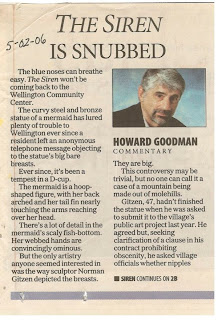Electronic voting was easy enough ... so why do I feel uneasy?
By Howard Goodman | Commentary
It took five minutes.
I walked into the South County Elections Office, and a couple of kindly poll workers took my name and address, checked my driver's license and handed me a plastic card.
I inserted the card into the machine, and a virtual ballot appeared on screen.
I made my choices, looked them over, then pushed the final button.
Poof.
My votes were gone.
Recorded, I hoped.
Gee, I thought: That was easy.
But I felt uneasy.
There was no piece of paper to look over one last time before releasing it from my fingers into a ballot box.
There was nothing but blank screen.
Like every other voter in the new e-voting age, I have to trust that the tabulations will accurately reflect my choices.
And that no accidental bug or intentional saboteur erases my votes.
Or sticks them in the other guys' columns.
Yet sorry to say, the systems we're using don't merit our trust.
Sure, spokesmen for this big-bucks industry tell us there's nothing to worry about. But experience is showing otherwise.
In Maryland last month, machines froze, access cards choked, computerized voter lists crashed -- a combination of technical and human error.
Gov. Robert Erlich, a Republican, was so fed up, he now wants to scrap his state's $106 million system and return to paper ballots.
Maryland's equipment is from Diebold Election Systems, whose machines have been hacked in experiments at Princeton University and in the office of Leon County Elections Supervisor Ion Sancho.
Palm Beach County uses a system by Sequoia Voting Systems, which is currently under fire for alleged ties to Venezuela's President Hugo Chavez. The convoluted history here involves the California-based company's sale last year to a much smaller company called Smartmatic Corp. with headquarters in a tree-lined office park in Boca Raton. Smartmatic was founded by a young Spanish-Venezuelan engineer named Antonio Mugica and two colleagues. After getting what officials called a small business loan of $200,000 from a Venezuelan government financing agency, the young company supplied machines in Venezuela for a 2004 referendum on Chavez -- making so much money, they were able to buy 100-year-old Sequoia for $120 million in 2005.
At a conference-call press conference in Washington on Monday, Mugica saw nothing fishy in his firm's meteoric growth. "We have the best technology," he said.
Mugica and company spokesman denied the firm is owned or controlled by the leftist Chavez. They said they develop and sell voting machines; they don't run elections.
To prove they're on the up and up, they said, they had invited the federal investigation, by the Committee on Foreign Investment in the United States, that made headlines over the weekend.
Smartmatic's business practices might prove to be as completely ordinary as its officials say.
It's in the nature of private companies to do things like contribute heavily to the Republican Party (Diebold) or set up international business arrangements with countries our government doesn't like (Smartmatic).
But when the private companies that do these ordinary things play a dominant role in our elections procedures without sufficient oversight, we are clearly playing with fire.
Fact is, as long as there have been elections in America, there has been mischief. The expression "stuff the ballot box" doesn't come from nowhere.
And yet, Florida has adopted inane rules that don't allow hand recounts when electronic voting is involved.
That don't allow us to look inside the machinery to check that everything is kosher.
That wise man, Ronald Reagan, said in regard to treaties with the Soviet Union, we must be able to "trust,but verify."
Right now, we can't verify that the votes which define our democracy are being counted correctly.
So how can we trust?






